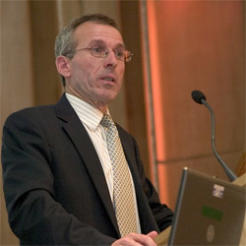Charities must resist the urge to compete – for funds, donors and contracts – and focus instead on how they can share information and help each other out, former Charity Commission chief Andrew Hind said last night.
In the annual Charity Trustee Networks lecture, Hind said that “significant potential for non-competitive advantage exists within the sector”, but is not being exploited.
“Trustees can and should do more to balance natural competition between charities with a greater degree of co-operation,” he said. “We don’t value or nurture the charity ecosystem well enough. We don’t recognise the extent to which charities, and their beneficiaries, depend on one another’s success. We don’t encourage enough mutual support and co-operation within the sector as a whole.”
He said that while individual charities were associated with compassion, generosity and humanity, “when it comes to the relationship between charities, behaviours often revert to instinctive Darwinism”.
Yet the fact is that charities benefit from each others’ success and when one suffers, all do. Hind cited negative media coverage as an example. “Negative media coverage of one charity is likely to affect public trust in the sector as a whole. If Mrs X reads about financial mismanagement at the charity next door to you, she might well decide to cancel her direct debit to your charity.”
Once the budget cuts hit the Charity Commission and affect its ability to offer the same level of guidance and advice, Hind said, “all trustees must take responsibility for the health of the charity ecosystem”.
Systematic one-to-one links between trustees
He proposed a series of initiatives to help improve the performance and perception of the sector. “I’d like to see the development of systematic one-to-one links between trustees,” he said.
Buddying and mentoring programmes for individual trustees, and ‘charity twinning’ progammes for boards could all help to spread good practice in governance, he said.
He cited the recent Charity Commission research report Back on Track which found that governance failures are among the most common causes of serious non-compliance with charity law and Commission guidance.
“The vast majority of these problems are not caused by malicious, evil-minded individuals who set out to deliberately subvert charities for their own selfish ends….they are mostly people who are simply not aware of the duties of trustees.”
He also called on the government to facilitate a new culture of co-operation by favouring, in the awarding of contracts, those bigger charities that go out of their way to support smaller, less experienced charities with their governance and management. Grant-making trusts could adopt a similar policy, he said.
Two-for-one donation system
Another idea, which Hind admitted would be more controversial, would be for large charities to set up a two-for-one donation system where they would ask donors if they supported giving a percentage of their donation to small, independent charities working towards a similar cause. This could be linked to a commitment by the larger charity to support the development of good governance within the partner organisation.
Such outreach might go some way to addressing the kind of criticism levelled by government representatives lately that large charities have become unresponsive and irrelevant, he said.
In conclusion, he said trustees needed to ditch the “survival of the fittest” mentality and ask themselves “what can I do to protect the charity ecosystem”.
- Andrew Hind will be exploring these ideas and more during his guest-editorship of Charity Finance next February, March and April.










